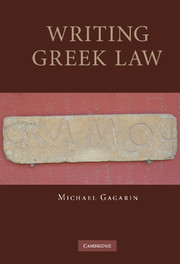Book contents
- Frontmatter
- Contents
- List of illustrations
- Preface and Acknowledgments
- List of abbreviations
- Introduction: Writing Greek Law
- Chapter 1 Law before Writing
- Chapter 2 Writing and Written Laws
- Chapter 3 Why the Greeks Wrote Laws
- Chapter 4 Why Draco Wrote his Homicide Law
- Chapter 5 Oral and Written in Archaic Greek Law
- Chapter 6 Writing Laws in Fifth-Century Gortyn
- Chapter 7 Writing the Gortyn Code
- Chapter 8 Writing Law in Classical Athens
- Chapter 9 Writing Athenian Law: a Comparative Perspective
- Chapter 10 Writing Law in Hellenistic Greece
- Conclusion: Writing Greek Law
- Appendices
- Bibliography
- Index Locorum
- Subject Index
Chapter 10 - Writing Law in Hellenistic Greece
Published online by Cambridge University Press: 22 September 2009
- Frontmatter
- Contents
- List of illustrations
- Preface and Acknowledgments
- List of abbreviations
- Introduction: Writing Greek Law
- Chapter 1 Law before Writing
- Chapter 2 Writing and Written Laws
- Chapter 3 Why the Greeks Wrote Laws
- Chapter 4 Why Draco Wrote his Homicide Law
- Chapter 5 Oral and Written in Archaic Greek Law
- Chapter 6 Writing Laws in Fifth-Century Gortyn
- Chapter 7 Writing the Gortyn Code
- Chapter 8 Writing Law in Classical Athens
- Chapter 9 Writing Athenian Law: a Comparative Perspective
- Chapter 10 Writing Law in Hellenistic Greece
- Conclusion: Writing Greek Law
- Appendices
- Bibliography
- Index Locorum
- Subject Index
Summary
Classical Athenian law is often seen as the high point in Greek legal history, but the story does not end there, and for the sake of completeness, I will briefly look at law in the Hellenistic world. The conquests of Philip and Alexander at the end of the fourth century changed the Greek world in important ways, but in many respects life in Greek cities remained unchanged. Although no longer in control of their relations with other cities or completely free to determine their own leaders (who now needed the support of Macedonian rulers more than of the dēmos), these cities continued to regulate their internal affairs, and it appears that private law, at least, continued more or less unchanged in Athens and other Greek cities.
At the same time, Alexander's conquests included many areas that were not previously Greek, in most of which he encouraged Greeks (often his own mercenary soldiers) to settle and even founded new Greek cities. These Greek settlers coexisted with the native inhabitants and often with settlers from other countries, creating new communities which did not have a history of traditional Greek institutions. These new settlers usually came from several different Greek cities, so that except in the most general ways, they lacked a common legal heritage. Given these very different circumstances, it is not surprising that the legal systems in these newly Greek cities and territories differed from those of long established Greek cities.
- Type
- Chapter
- Information
- Writing Greek Law , pp. 225 - 241Publisher: Cambridge University PressPrint publication year: 2008
- 1
- Cited by

